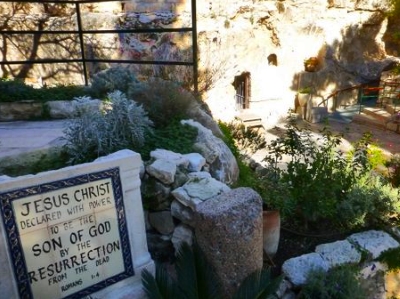Easter

[11 April 1773]
|
1 Peter 1:21
|
|
Who by [Christ] do believe in God, that raised him up from the dead, and gave him glory; that your faith and hope might be in God. |
|
|
|
The apostles when speaking of Christ take it for granted that his name, his love, his work, were familiar to believers. |
 |
|
How should our hearts burn at verse 18. [1] [2] Redeemed intimates at once former misery, present happiness and security, and the amazing love manifest in our redemption. Then he leads us far back – this love to sinners is no new thing, but was planned before time and though after the entrance of sin many ages passed, yet in the appointed hour was revealed – and what crowns the mercy – to you. [3]
|
|
In this verse we have: |
|
1. |
The object of faith |
|
|
God as known in or by Christ. That there is a God is commonly believed. But to believe in God, so as to trust in him, and to choose him as our portion is another thing. Natural notions of God afford no comfort or hope. The true God is only known in Christ or approached to by Christ. Without, we are afraid and say, Depart from us. [4] Guilt and ignorance misrepresent him, but when viewed in Christ he is adorable and lovely. So should God look upon us - without respect to Christ we should be consumed, but in and through him he is well pleased. That is unless Christ is considered both by God and us, as our atonement, righteousness and head, there can be no communion. Through the medium of sin he appears as an angry judge, but through Christ as a reconciled father. |
|
|
|
|
|
2. |
The especial warrant |
|
|
God’s raising him from the dead and giving him glory. When Jesus died the disciples were at first staggered. They trusted it had been he. But when he was raised from the dead, they were glad when they saw him. |
|
|
|

garden tomb, Jerusalem |
 |
|
|
2.1 |
He was raised for our justification |
|
|
|
A full proof that his obedience and death was accepted. All paid by him, and his people acquitted. |
|
|
2.2 |
He received glory |
|
|
|
All power, and a name above every name. In this is his people interested, he took possession as their surety and forerunner. For as the head, so the members. |
|
|
|
|
|
3. |
In this way our faith and hope [are] in God |
|
|
Looking to the reception Jesus met with we may expect the same: |
|
|
3.1 |
A discharge from all sin |
|
|
3.2 |
Supplies of all grace |
|
|
3.3 |
Access to God at all times |
|
|
3.4 |
A glorious resurrection |
|
|
3.5 |
A glorious inheritance - that where he is we shall be also [5] |
|
|
|
|
|
Infer: |
|
|
See the Lord would afford us strong consolation. |
|
|
They who are thus risen with Christ should seek the things above. |
|
|
Unless you thus look to Christ, you can have neither faith or hope in God. |
Endnotes:
|
[1] |
1 Peter 1:18 Forasmuch as ye know that ye were not redeemed with corruptible things, as silver and gold, from your vain conversation received by tradition from your fathers; |
|
[2] |
The ms reads “How fast should our hearts burn”. First impression is that a line may have been drawn through part of the word “fast”. Newton may have been going to write “How fast should our hearts beat” and changed it to the more familiar wording of the disciples on the Emmaus road in Luke 24:32 Did not our heart burn within us, while he talked with us by the way, and while he opened to us the scriptures? “How should our hearts burn” is a common clause in literature of the era, e.g. Isaac Watts in “A Serious Address to the People” in A Humble Attempt towards the Revival of Practical Religion among Christians…, 1731. |
|
[3] |
1 Peter 1:13 Wherefore gird up the loins of your mind, be sober, and hope to the end for the grace that is to be brought unto you at the revelation of Jesus Christ;
1 Peter 1:20 Who verily was foreordained before the foundation of the world, but was manifest in these last times for you, |
|
[4] |
Luke 5:8 When Simon Peter saw it, he fell down at Jesus' knees, saying, Depart from me; for I am a sinful man, O Lord. |
|
[5] |
John 14:3 And if I go and prepare a place for you, I will come again, and receive you unto myself; that where I am, there ye may be also. |
Acknowledgements:
Lambeth Palace Library, MS 2940, John Newton's sermon notebook No. 39, ff 87-90
Princeton University, John Newton Diary, CO199
|